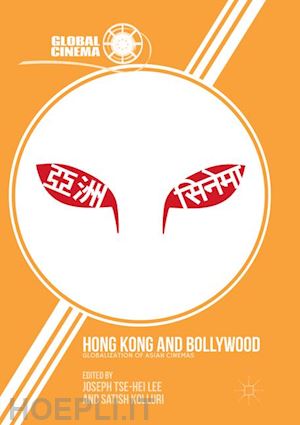
Questo prodotto usufruisce delle SPEDIZIONI GRATIS
selezionando l'opzione Corriere Veloce in fase di ordine.
Pagabile anche con Carta della cultura giovani e del merito, 18App Bonus Cultura e Carta del Docente
This volume examines the transmission, reception, and reproduction of new cinematic styles, meanings, practices, and norms in early twenty-first-century Asia. Hong Kong and Bollywood offers new answers to the field of inter-Asian cultural studies, which has been energized by the trends towards transnationalism and translatability. It brings together a team of international scholars to capture the latest development in the film industries of Hong Kong and Mumbai, and to explore similar cross-cultural, political, and socioeconomic issues. It also explains how Hong Kong and Bollywood filmmakers have gone beyond the traditional focus on nationalism, urbanity and biculturalism to reposition themselves as new cultural forces in the pantheon of global cinema.
.1 Situating Hong Kong and Bollywood Cinemas in the Global Satish Kolluri and Joseph Tse-Hei Lee.- Part I The Politics of Representation and Representation of Politics.- 2 The Trajectory of Bollywood Lyrics Ali Mir and Raza Mir.- 3 Transformation of Hong Kong Gangster Films before and after CEPA Kinnia Shuk-Ting Yau.- 4 Despair and Hope: Political Cinema in Hong Kong Joseph Tse-Hei Lee.- 5 Chinaman, not Hindustani: Stereotypes and Solidarity in a Hong Kong Film on India S. V. Srinivas.- 6 1911: Cinematic Contradictions of Greater China Siu-Keung Cheung.- Part II: The Crisis of Representation and Representation of Crisis.- 7 What is so Asian about Asian Parenting? Deconstructing “Tiger Moms” and “Tiger Dads” in Neoliberal Times through Taare Zameen Par and I Not Stupid Satish Kolluri.- 8 Negotiating Cold War and Post/Colonial Politics: Borders and Boundaries in 1950s Hong Kong Cinema Jing Jing Chang.- 9 Slum Extravaganza! Cultural and Geopolitical Representation of Dharavi in Celluloid India Sony Jalarajan Raj and Rohini Sreekumar.- 10 Life without Principle: Financial Irregularities in Hong Kong Siu-Keung Cheung.- Part III: The Aesthetics of Representation and Representation of Aesthetics.- 11 Questioning Modernity: Space, Consumption and Loss in Hong Kong New Wave and Bombay Parallel Cinema Surajit Chakravarty.- 12 Naqal and the Aesthetics of the Copy Anjali Gera Roy.- 13 Undercranking and Step-printing in Wong Kar-Wai’s Filmography Patrick Sullivan.- 14 Mirrored Alterity: The Imaginary China and the Comedic Self in Chandi Chowk to China Michael A. Mikita.- 15 Hong Kong, Film, and the Building of China’s Soft Power: The Cross-Promotion of Chinese Film on Globally-Oriented State Television Lauren Gorfinkel and Xuezhong Su.
Joseph Tse-Hei Lee is Professor of History and Executive Director of the Confucius Institute at Pace University, USA.
Satish Kolluri is Associate Professor of Communication Studies at Pace University, USA.











Il sito utilizza cookie ed altri strumenti di tracciamento che raccolgono informazioni dal dispositivo dell’utente. Oltre ai cookie tecnici ed analitici aggregati, strettamente necessari per il funzionamento di questo sito web, previo consenso dell’utente possono essere installati cookie di profilazione e marketing e cookie dei social media. Cliccando su “Accetto tutti i cookie” saranno attivate tutte le categorie di cookie. Per accettare solo deterninate categorie di cookie, cliccare invece su “Impostazioni cookie”. Chiudendo il banner o continuando a navigare saranno installati solo cookie tecnici. Per maggiori dettagli, consultare la Cookie Policy.